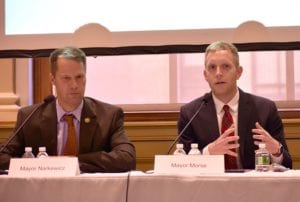Who is a member?
Our members are the local governments of Massachusetts and their elected and appointed leadership.

Holyoke Mayor Alex Morse (right) discusses his city’s approach to adult-use marijuana at a forum held by the Cannabis Control Commission and Social Law Library in Boston on Dec. 18. Listening to Morse is fellow panelist and Northampton Mayor David Narkewicz.
A dozen local officials took part in a half-day forum on Dec. 18 in Boston to discuss their experiences related to recreational marijuana commerce.
The forum, intended to share perspectives from communities that have decided to move forward with hosting adult-use marijuana establishments, was hosted by the Cannabis Control Commission and the Social Law Library, in collaboration with the MMA.
With most temporary local moratoriums having expired or due to expire very soon, the majority of the Commonwealth will be open for business. Municipal leaders stressed that they want to see marijuana businesses succeed, while at the same time making efforts to mitigate disruption and negative impacts on existing neighborhoods.
A key takeaway from the forum was that applicants should take time to get to know the community that they want to become part of.
All panelists were enthusiastic about the prospect of revenue being put back into the community from this industry. Particularly given the state’s strength in research institutions, they also discussed how more funding for research on the health effects of marijuana is important, as the health benefits and negative side effects of particular strains are largely unknown.
The first panel featured Northampton Mayor David Narkewicz, Holyoke Mayor Alex Morse, Great Barrington Selectman Edward Abrahams, Framingham Chief Operating Officer Thatcher Kezer, and Hudson Executive Assistant Thomas Moses, with MMA Executive Director Geoff Beckwith as moderator.
The local leaders discussed the steps they have taken to integrate this new industry into their communities. Each panelist began by stating what percentage of their community voted for the legalization of recreational marijuana on the 2016 statewide ballot, and how that level of support plays into their decision-making process.
Panelists discussed the local zoning in place for marijuana establishments, highlighting the unique approaches they have all taken.
Mayor Narkewicz said his city is treating marijuana like any other business, with non-restrictive zoning in place. Abrahams said Great Barrington has a permitted marijuana retailer between two toy stores, but there can be no signage indicating what the store sells, children are not allowed inside, and there can be no handouts, so he sees no reason to be concerned.
Mayor Morse said Holyoke has a special permit process, but there is significant space available for marijuana establishments.
Citing his city’s history, he said Holyoke is ready to transition from “the paper city to the rolling paper city.”
The panelists discussed the fact that some of their communities are surrounded by others that have either a ban or a temporary moratorium in place, which led to an influx of applicants for marijuana establishments in their communities. With most moratoriums expiring at the end of this year, the market is expected to even out across the state.
The second panel, “Specific Issues: Social Equity, Economic Development, Public Health and Other Considerations,” featured attorney Ray Miyares of Miyares & Harrington, Somerville Strategic Planning and Community Development Director George Proakis, Holyoke Planning and Economic Development Director Marcos Marrero, Amherst Economic Development Director Geoff Kravitz, Framingham Health Director Sam Wong, Mike Dundas from Sira Naturals, Sieh Samura from 612 Studios, and Lowell Development Services Director Eric Slagle. The panel was moderated by Cannabis Control Commission Executive Director Shawn Collins.
The panel’s discussion centered around the negotiation of host community agreements as well as social equity and economic empowerment applicants.
Proakis highlighted Somerville’s vetting process, noting how the city is planning for an equal number of established companies and companies owned by local residents or economic empowerment applicants.
Kravitz said negotiations for host community agreements in Amherst are a back-and-forth process, while others said they are using a template as much as possible, though they are not opposed to negotiating outside the template.
The forum, titled “Moving Ahead with Marijuana: Municipal Perspectives from Marijuana-Forward Communities,” was recorded, and a link will be posted on the MMA website when it becomes available.